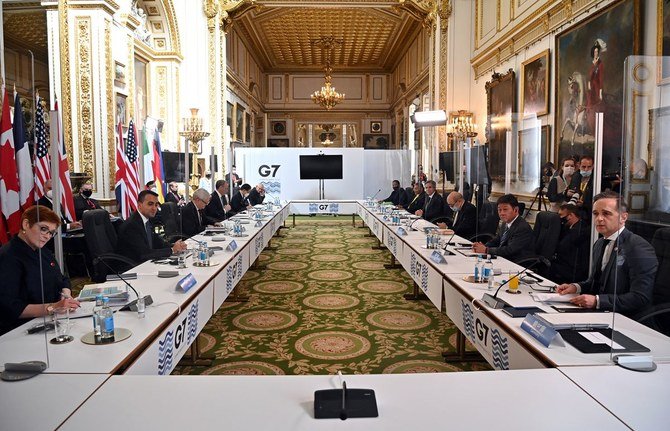
- ARAB NEWS
- 14 Jul 2025

Fortune and good governance have combined well for London this week, as the UK government welcomed G7 foreign ministers for the prep conference ahead of next month’s main event. At a time when the US is looking to re-establish its international credentials after a four-year hiatus, what better stage than a London easing out of lockdown and equally eager to put the pain of separation from the EU behind it and find common ground with close neighbors and key partners?
Foreign Secretary Dominic Raab had two key aims. The first was to cement that alliance with the US. The initial press conference went well for both. Gone was the anticipated uneasiness based on Brexit and Ireland. Raab will have welcomed Secretary of State Antony Blinken’s unequivocal warmth in describing the relationship, as well as his headline support for open societies and human rights — key issues for Raab personally and the UK. The US will not have missed the UK’s recognition of its renewed commitment to NATO, putting behind them the disastrous Trump era of doubt on such a fundamental issue, or the UK’s own tilt to the east, which chimes to a degree with that of Washington.
London has welcomed the first 100 days of President Joe Biden. While it would have been understandable for the administration to focus almost exclusively on domestic turmoil, its experienced foreign policy team has made sure that the message of international engagement is heard, from climate change to alliances. The UK will have some questions to ask about Afghanistan, as there was not universal support for the US decision to leave with so much still undecided. Britain also has a strong domestic interest in the talks involving Iran. It shares the determination to return to the nuclear deal in some form, having invested heavily in it originally. While the UK is clear-eyed about all the problems associated with re-engaging Iran — and what rightly concerns neighbors and allies in the region — halting a risk of major confrontation is high on the UK agenda. The issue of dual-national hostages is of rising political debate here and, while wanting to see existing prisoners released, London will want the whole hostage tactic to be of higher profile.
The Foreign Office welcomed the appointment of Special Envoy Tim Lenderking to Yemen, agreeing with the US that resolving that conflict would open many opportunities in the region, not least some chance of encouraging a tentative reaching out between Saudi Arabia and Iran. It will also welcome the chance to see what the president’s team makes of the Abraham Accords as a pathway to further positive opportunities in the region, as opposed to a defensive alliance against adversaries, and whether Donald Trump’s unconditional support for Israel has morphed into an unquestioned security commitment, but with a steelier edge in relation to settlements and rights issues, as a recent Carnegie Endowment paper argued.
The foreign secretary’s second aim was to emphasize the UK’s central position in the G7 as the world confronts the reality of a messy post-coronavirus disease landscape and heads to November’s Glasgow COP26 climate summit. Hopes of a clean exit from the pandemic should be tempered with the reality of the experiences of the poorest people in the world. Vaccine nationalism requires a formula to deal not just with India today, but who knows where tomorrow. The UK will be looking for evidence that global health security and the ambition that “no one is safe until all are safe,” sometimes repeated all too glibly, is translated into action, though it may be pressed to do still more on development itself.
London will be looking for evidence that the ambition that ‘no one is safe until all are safe’ is translated into action.
Alistair Burt
The biggest win, however, comes from the fact that these eagerly awaited face-to-face meetings cannot help but dent the aims of those whose ambition is the breakdown of the international order, which has been perilously close at times over the last four years. A common front against authoritarianism as a threat to liberal democracy should foster the sense that betting against those who together champion openness in trade, rights and media is unwise, so cooperation seems a better course. Common approaches are necessary toward Russia and China, so the addition of the Association of Southeast Asian Nations states, plus India, Australia, South Korea and South Africa, as guests to the G7 makes that point, while also reflecting the UK’s renewed global ambitions.
Placing the coup in Myanmar in the global spotlight raises the stakes in terms of reaction against such an affront to the country’s democratic status, but what will result in practice? However, the UK’s elevation of the issue is a welcome challenge to a growing sense that brutal repression is an inevitable winner in a divided world.
It is one thing for the international order to come together again, but it is quite another for it to exert positive influence on the variety of global crises. Compared with recent times, this week is a step forward in many ways and London will be gauging reaction keenly.